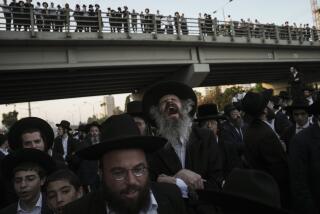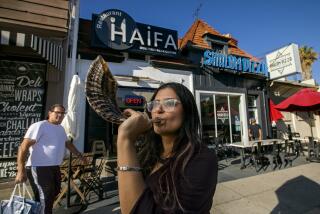Arab Leaders to Call Strike Protesting Bias in Israel
- Share via
HAIFA, Israel — Leaders of Israel’s Arab community decided Saturday to call a general strike of “unlimited duration” to protest economic and social discrimination, an Arab mayor said Saturday.
Samir Darwish, mayor of the town of Baka el Gharbiya, said the strike will begin next Sunday and will include the closures of all Arab municipal offices, schools and businesses.
“Arab workers will not go to their jobs. This will, of course, affect the Jewish population, since many industrial workers and most of the service workers are Arabs,” he said in a telephone interview.
Meeting Near Haifa
Darwish said the leaders of Israel’s Arab community of 700,000 agreed to the strike at a meeting Saturday in the northern Arab town of Shefaram, nine miles east of Haifa. The Jewish population in Israel is about 3.5 million.
He said 50 people were at the meeting. Participants included five Arab left-wing legislators, representatives of the National Council of Arab Municipalities, members of the Committee for Protection of Arab Land and student leaders, he added.
The meeting was called in response to the Israeli Cabinet’s decision this month to raise university tuition fees for anyone who has not served in the armed forces. Most Jewish men and women face compulsory military duty, but Israeli Arabs are exempt.
The higher tuition fee will affect about 3,700 Arabs and was “the straw that broke the camel’s back,” Darwish said. Israeli authorities say the increase is necessary to cope with a financial crisis, and they note that Arabs are allowed to enlist in the military, if they wish.
Budget Disparities Cited
In addition, Darwish said Arabs are upset over disparities in budgets for Arab and Jewish towns and over the shortage of Arab classrooms.
He said the leaders decided to call for “a continuous strike until all the problems are solved.”
Earlier this month, Nimr Morkof, secretary of the National Council of Arab Municipalities, said Arab towns receive only one-fourth the amount of money allocated to Jewish towns for regular expenses and one-tenth the amount allocated for development.
More to Read
Sign up for Essential California
The most important California stories and recommendations in your inbox every morning.
You may occasionally receive promotional content from the Los Angeles Times.













